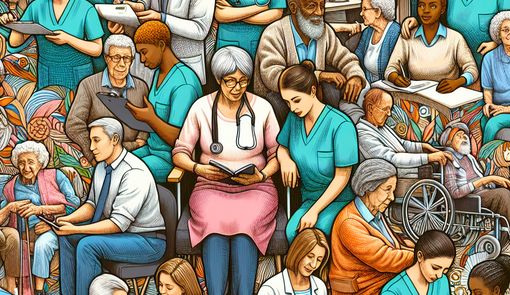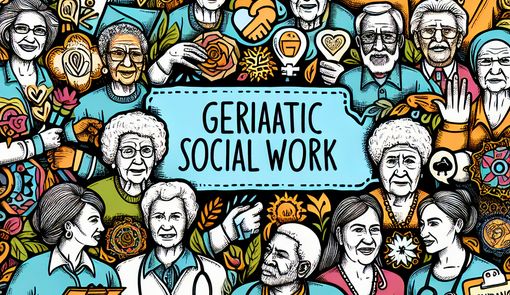Becoming a Geriatric Social Worker: A Step-by-Step Career Guide

The field of social work is as diverse as the communities it serves, with specializations that address the unique challenges of different population groups. One such specialization is geriatric social work, which focuses on the needs of aging individuals. Geriatric social workers help older adults maintain their independence, navigate healthcare systems, access services, and enhance their quality of life. The path towards becoming a geriatric social worker involves a combination of education, field experience, and licensing. In this article, we'll explore the step-by-step process needed to pursue a career in geriatric social work.
Step 1: Understand the Role of a Geriatric Social Worker
Before embarking on the path to become a geriatric social worker, it is important to have a clear understanding of the role and the unique challenges it presents. Geriatric social workers not only advocate for and support older adults but also often liaise with families, healthcare providers, and community resources. They are equipped to address issues such as mental health, caregiving stress, elder abuse, and the complexities of end-of-life planning.
Step 2: Obtain a Bachelor's Degree
A Bachelor's degree in social work (BSW) is typically the minimum educational requirement to begin a career in geriatric social work. Programs accredited by the Council on Social Work Education (CSWE) ensure that the curriculum meets industry standards and provides a foundation of knowledge in social welfare policy, human behavior, and social work practice. Concurrent fieldwork during a BSW program furthers hands-on experience.
Step 3: Pursue a Master's Degree in Social Work
While a Bachelor's degree may allow for entry-level positions, a Master of Social Work (MSW) degree opens up greater career opportunities in geriatric social work. An MSW program, which can also be accredited by CSWE, offers specialized courses in gerontology and advanced clinical training. Full-time MSW programs typically take two years to complete, though part-time and advanced standing programs are available for those with a BSW.
Step 4: Gain Field Experience
Field experience is a crucial aspect of training to be a geriatric social worker. MSW programs require a significant amount of supervised field education, often specific to working with older adults. This experience provides practical skills and knowledge that can only be learned outside the classroom. Prospective geriatric social workers should seek internships or volunteer opportunities in settings such as senior centers, long-term care facilities, or hospice care.
Step 5: Become Licensed
After obtaining an MSW, the next step is to pursue licensure, which is required to practice as a geriatric social worker in most states. The process typically involves passing a national exam administered by the Association of Social Work Boards (ASWB) and meeting state-specific requirements, which may include additional exams or supervised clinical hours. Licensure ensures that social workers meet professional standards and provide competent care.
Step 6: Consider Certification
While not always required, professional certification can enhance a geriatric social worker's qualifications. The National Association of Social Workers offers the Certified Social Worker in Gerontology (CSW-G) credential to those who meet certain educational and experience criteria. This certification signifies expertise in geriatric social work and a commitment to professional development.
Step 7: Continue Professional Development
The field of geriatric social work is continuously evolving, with changes in policies, practices, and population needs. Engaging in lifelong learning is essential. Geriatric social workers must stay current through continuing education, seminars, and workshops. Professional development opportunities help social workers to expand their skills and stay informed about the latest research and best practices in geriatric care.
Conclusion
Becoming a geriatric social worker is a rewarding journey that requires dedication and a deep understanding of the complexities facing the aging population. By following these steps - obtaining a relevant degree, gaining field experience, achieving licensure, and staying engaged in professional development - individuals can embark on a meaningful career path. Supporting older adults in achieving their highest quality of life is both a challenging and fulfilling vocation at the crux of social service and healthcare. Those called to this work will find that they not only make a significant impact on the lives of the elderly but will also grow and evolve in their professional and personal lives.
Frequently Asked Questions
What are the typical job responsibilities of a geriatric social worker?
Geriatric social workers are responsible for advocating for and supporting the well-being of older adults. They help seniors navigate healthcare systems, access social services, address mental health issues, and ensure their overall quality of life. Additionally, they often work with families, healthcare providers, and community resources to provide comprehensive care to aging individuals.
Is a Bachelor's degree in social work necessary to become a geriatric social worker?
While a Bachelor's degree in social work (BSW) is typically the minimum educational requirement for entry-level positions, a Master's degree in Social Work (MSW) is often preferred for more advanced roles in geriatric social work. The BSW provides a foundational knowledge base, but an MSW offers specialized courses in gerontology and advanced clinical training, enhancing job opportunities and career growth.
How long does it take to become a licensed geriatric social worker?
The time it takes to become a licensed geriatric social worker varies depending on the individual's educational path and state requirements. Typically, completing a Bachelor's degree in social work takes four years, followed by a two-year Master's degree program. After obtaining the necessary degree, aspiring geriatric social workers need to gain supervised field experience, which can take an additional 2-3 years. Finally, the licensure process, including exams and fulfilling state-specific requirements, may take several months to a year.
What is the importance of professional certification for geriatric social workers?
Professional certification, such as the Certified Social Worker in Gerontology (CSW-G) credential, can demonstrate a geriatric social worker's expertise and commitment to the field. While not always mandatory, certification can enhance job prospects, credibility, and professional development opportunities. It signifies a dedication to excellence and a desire to stay current with best practices in geriatric care.
How can geriatric social workers stay updated on the latest trends and research in the field?
Continuing education and professional development are key for geriatric social workers to stay informed about the evolving landscape of geriatric care. Attending workshops, seminars, conferences, and pursuing additional certifications can help professionals expand their knowledge, skills, and network within the industry. Engaging in lifelong learning ensures that geriatric social workers provide high-quality care that aligns with current best practices.
Further Resources
For those interested in pursuing a career in geriatric social work, there are abundant resources available to deepen understanding, gain practical knowledge, and stay updated on the latest trends in the field. Here are some valuable resources:
- National Association of Social Workers (NASW): NASW offers a wealth of information on geriatric social work, including webinars, publications, and networking opportunities.
- Council on Social Work Education (CSWE): CSWE provides accreditation for social work programs and offers insights into educational standards for aspiring geriatric social workers.
- Association of Social Work Boards (ASWB): ASWB is responsible for licensing social workers and provides exam preparation materials and resources for licensure.
- Gerontological Society of America (GSA): GSA is a leading organization in gerontology, offering conferences, research publications, and networking opportunities for professionals in the field.
- American Society on Aging (ASA): ASA provides a platform for geriatric social workers to access educational resources, attend conferences, and connect with peers.
- National Institute on Aging (NIA): NIA offers valuable resources on aging research, health information for older adults, and funding opportunities for professionals in the aging field.
- Social Work Today: This online publication covers a wide range of social work topics, including articles specifically focused on geriatric social work practices.
- Journal of Gerontological Social Work: A scholarly journal that publishes research on social work practice with older adults.
- Aging Life Care Association: Formerly the National Association of Professional Geriatric Care Managers, this organization offers resources for professionals working with older adults and their families.
- Caregiver Action Network: Provides support, education, and resources for family caregivers, which can be beneficial for geriatric social workers supporting caregivers in their practice.
By exploring these resources, aspiring and practicing geriatric social workers can enhance their knowledge, skills, and effectiveness in serving the aging population.






